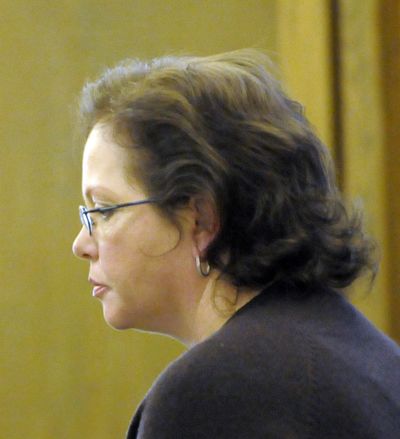Stark murder trial starts Monday
Defense says battered wife syndrome led to shooting

A former Internet prostitute admits she shot her husband five times in the back in a late-night confrontation in a south Spokane home more than two years ago.
But the first-degree murder trial of Shellye Lynn Stark, with opening arguments set to begin Monday, isn’t about whether she did it: It’s about whether the shooting was justified.
More than a year after Dale Robert Stark died in the home he shared with the couple’s teenage son, 12 jurors will decide whether his estranged wife should walk free or go to prison.
A hearing last week offered a glimpse at how both sides will present their cases, with the prosecution painting Shellye Stark, who will turns 47 on Tuesday, as a calculated killer seeking her husband’s estate, and the defense portraying her as a victim of years of marital abuse that led to an abnormal reaction when her husband threatened her.
At the center of the defense’s case is a disorder called battered women’s syndrome and a psychologist considered the national expert on the condition. Domestic violence expert Dr. Lenore Walker has testified in hundreds of trials, including the 1994 trial of Patricia Gallagher in Boundary County, Idaho.
Gallagher was acquitted of second-degree murder in the shooting death of her husband after the defense outlined years of abuse and raised doubt as to whether Gallagher was the shooter.
But that acquittal took two trials – the first jury couldn’t reach a verdict.
Now Walker will be testify in a case that appears to be a hot topic on some crime blogs and in the online prostitution community, where Stark and her boyfriend, Brian L. Moore, of Orange County, Calif., were prominent figures.
Her testimony is key to Stark’s defense, her lawyers, Russell Bradshaw and Bryan Whitaker, said at the Feb. 11 hearing before Spokane County Superior Court Judge Tari Eitzen, who will preside over the trial.
Eitzen hammered the defense about a lack of police reports and other evidence to corroborate claims that Dale Stark mentally and physically abused Shellye Stark through their marriage of more than 20 years, punching her, forcing her into prostitution and, on two occasions, raping her with a foreign object – causing two babies to be stillborn.
While Stark’s medical records document the births, they make no mention of the alleged rapes, her lawyers said.
“Things go on behind closed doors that no one knows about, and that has been the case with this,” Bradshaw said. “In domestic violence, victims, I think it’s fair to say, often don’t disclose what’s happened.”
Deputy prosecutors Mark Cipolla and Larry Haskell sought to disqualify Walker’s testimony to be disqualified. While that effort was unsuccessful, Eitzen’s remarks led Bradshaw to admit “we don’t have as much as I wish we had.”
The lack of documented evidence of a cycle of marital abuse has “been so frustrating for us about this case,” Bradshaw said. “There is not a lot of corroborating evidence.”
The prosecution says that’s because the alleged abuse didn’t happen. Counseling sessions where Shellye Stark alleged abuse came after her husband’s death, prosecutors said.
Said Cipolla at the hearing: “The defense is putting the victim on trial here.”
Police arrived at Dale Stark’s home at 1620 S. Maple St. about 1:45 a.m. Dec. 9, 2007, in response to a 911 call from Shellye Stark about the shooting.
Shellye Stark had traveled from California and obtained a restraining order against her husband Dec. 7, court documents show. Her request for the restraining order alleges years of abuse and threats by Dale Stark.
Shellye Stark had been living in California for at least a year, working as what her lawyers called a “fairly high-priced” prostitute known as Nikita Jennifer who traveled across the country for appointments sometimes booked by Dale Stark.
She told police she was at the home with her nephew to serve the restraining order to her husband, who she said was due home early that morning from a business trip and had been threatening her and her boyfriend.
“She surprised him when he came home from the business trip at 2 or 3 in the morning,” said Spokane police Detective Kip Hollenbeck, the lead investigator. He called the killing “basically an ambush.”
But Shellye Stark said her husband, whom the defense describes as a compulsive gambler who flew into rages at the slightest disturbances, had threatened to kill her and was going to grab a kitchen knife on the table, court records show.
Years of physical and emotional abuse had made her a victim of battered women’s syndrome, Stark’s lawyers argue, which elevated her defensive reaction.
“He had a look in his eye,” Bradshaw said. “She knew what he was going to do.”
Understanding battered women’s syndrome will help explain “what some have considered an unnecessary act on behalf of the defendant,” Bradshaw told the court.
The Starks’ only child, Christopher, now 18, is listed as a witness for both sides. But the defense told Eitzen that he’ll be discussing abuse by his father and that he witnessed abuse against his mother, which Shellye Stark will also discuss on the stand.
Also expected to testify is Shellye Stark’s sister Karen Jacquetta, who police say drove from her Priest River home the day before Dale Stark’s death to deliver her sister a handgun. But when she hit a moose en route and was hospitalized, her son retrieved the weapon from the wreckage and gave it to his aunt, according to police.
E-mails Dale Stark sent to Shellye Stark and Moore, her boyfriend, could be presented by both sides. The defense says they show threatening behavior by Dale Stark; the prosecution says they show he was simply angry with Shellye and was demanding child support payments.
“The fact that a person got angry doesn’t make it an issue of battered wife syndrome,” Cipolla said.
Jury selection will continue Monday morning, and opening arguments could begin that day.